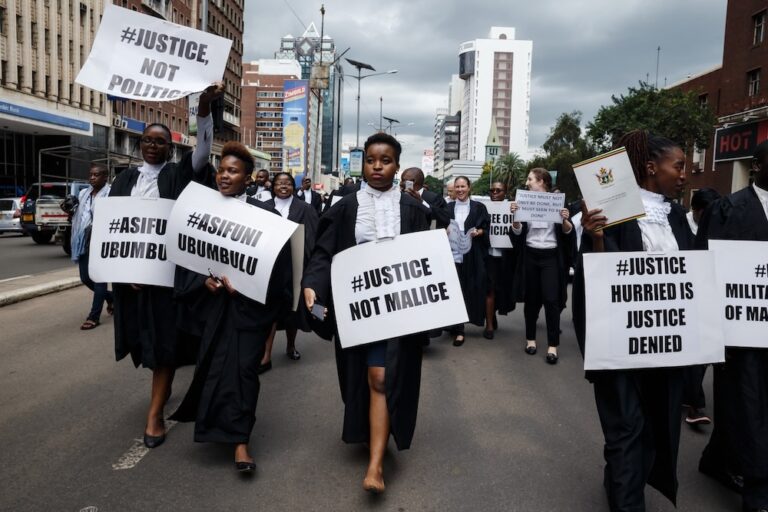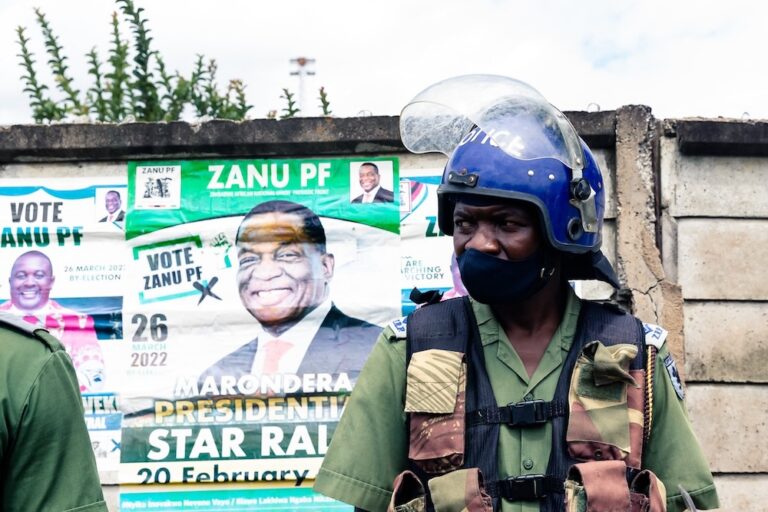(ARTICLE 19/IFEX) – The following is a 24 August 2004 ARTICLE 19 letter to Andrew Ranganayi Chigovera of the African Commission on Human and People’s Rights (ACHPR): Andrew Ranganayi Chigovera Focal Person on Freedom of Expression of the African Commission on Human and People’s Rights Via Facsimile: + 263 477 3247 ARTICLE 19’s concerns about […]
(ARTICLE 19/IFEX) – The following is a 24 August 2004 ARTICLE 19 letter to Andrew Ranganayi Chigovera of the African Commission on Human and People’s Rights (ACHPR):
Andrew Ranganayi Chigovera
Focal Person on Freedom of Expression of the
African Commission on Human and People’s Rights
Via Facsimile: + 263 477 3247
ARTICLE 19’s concerns about the 2004 Zimbabwean Non-Governmental Organisations Bill (NGO Bill)
24th August 2004
Dear Commissioner Chigovera,
ARTICLE 19 is gravely concerned about the recently gazetted Zimbabwean Bill on the operation of non-governmental organisations (NGOs).
The Bill, if passed in its present form, will prevent human rights organisations from operating in Zimbabwe. The registration requirements under the Bill and the overall control by the Non-Governmental Organisations Council (Council) and the Minister of Public Service, Labour and Social Welfare in the functioning of NGOs constitute an undue interference with freedom of expression and association.
ARTICLE 19 has consistently raised concerns (1) about the continued violations of human rights in Zimbabwe. Worryingly, the Government of Zimbabwe has utilised numerous measures to obstruct the work of the independent media and human rights defenders in violation of its international human rights obligations.
The enactment of legislation such as the Public Order and Security Act (POSA) in 2001 and the Access to Information and Protection of Privacy Act (AIPPA) in 2002, coupled with the frequent attacks on media practitioners, human rights defenders and political dissidents (2); the establishment of a government controlled Media and Information Commission and the closure of The Daily News among others, violate the right to freedom of expression and other fundamental freedoms.
The proposed NGOs Bill contains many provisions that violate the right to freedom of association, the right to freedom of expression and access to information and the right to seek and receive support to promote and defend human rights as guaranteed by international standards; especially the International Covenant on Civil and Political Rights, the African Charter on Human and Peoples’ Rights and the UN Declaration on Human Rights Defenders.
Foreign human rights NGOs are prohibited from operating in Zimbabwe. Clause 9, sub-section (4) of the Bill states: “no foreign non-governmental organisation shall be registered if its sole or principle objectives involve or include issues of governance.” The Bill defines “issues of governance” as including “the promotion and protection of human rights”. A foreign NGO means any NGO that “does not consist exclusively of permanent residents or citizens of Zimbabwe.” This deprives individuals of their right to associate freely as guaranteed by international human rights standards.
The Bill further prohibits local NGOs from receiving foreign funding or donations to carry out activities involved in or including issues of governance (Clause 17). ARTICLE 19 is of the view that this undue restriction introduced by Clause 17 of the Bill is inconsistent with Article 13 of the UN Declaration on Human Rights Defenders which guarantees everyone the right to solicit, receive and utilise resources for the express purpose of promoting and protecting human rights through peaceful means; it will further hinder access to information and diverse views in Zimbabwe.
Human rights organisations (governmental and non governmental) around the world have made major strides in defending human rights and exposing violations chiefly because of the work of human rights defenders and international support/assistance from non-profit funding agencies and foreign governments. Depriving NGOs, key actors of society, of their independence and resources to carry out their mandate is inconsistent with democratic values.
Another concern is the effect of the Bill on the existing human rights NGOs who may cease to operate if the Bill is enacted. The Bill introduces a harsh and excessive registration regime for NGOs in Zimbabwe. Under the Bill all NGOs must register with the Council; failure to register constitutes a criminal offence punishable by a fine or/and imprisonment up to six months (Clause 9).
In addition, the Bill does not provide for the independence and impartiality of the NGO Council, which is supposed to regulate and oversee the registration and the functioning of all NGOs in Zimbabwe. The Council is under the tight control of the government and lacks the independence required to render unbiased decisions. Under Section. 24. para. 5, the Minister can even appoint trustees of NGOs if all members are suspended. This section gives the Minister an overriding power to interfere directly in the internal affairs of NGOs.
Finally, ARTICLE 19 is also gravely troubled by the victimisation of many human rights organisations who are allegedly accused by government officials and state media to have provided information to the African Commission on Human and Peoples’ Rights during its fact finding mission in Zimbabwe in 2002. The right to receive and disseminate information is guaranteed by the African Charter and the Declaration of Principles on Freedom of Expression in Africa. The Government of Zimbabwe is obliged to respect freedom of expression and to protect whistleblowers from reprisals.
ARTICLE 19 has reason to believe that if this Bill is enacted, many NGOs will be silenced and the public deprived of its right to access alternative views and sources of information in Zimbabwe.
ARTICLE 19 urges you to ensure that the Zimbabwe government desist from enacting this Bill.
We also would like to urge you to continue monitoring the situation and ensure that the government of Zimbabwe stops the attacks on human rights defenders and freedom of expression advocates.
Yours sincerely,
Andrew Puddephatt
Executive Director
1. See, ARTICLE 19 Memorandum on the AIPPA January 2002 at http://www.article19.org/docimages/1315.doc
Censorship News Issue 58, Zimbabwe: A Case of Freedom of Expression and the Media in Rapid Decline, March 2002 at http://www.article19.org/docimages/1281.doc
ARTICLE 19 Briefing note on Repression of Journalists July 2002 at http://www.article19.org/docimages/1314.htm
2. ARTICLE 19’s Release on the Closure of The Daily News, September 2003 at http://www.article19.org
RECOMMENDED ACTION:
Similar appeals can be sent to:
Andrew Ranganayi Chigovera
Focal Person on Freedom of Expression of the
African Commission on Human and People’s Rights
Fax: + 263 477 3247
Please copy appeals to the source if possible.


